Founded in 2008, Kids in Parks started when the Blue Ridge Parkway Foundation, National Park Service, and Blue Cross Blue Shield of North Carolina Foundation came together with the vision of improving both parks and children's health.
The program offers a continuously growing network of family friendly outdoor adventures called TRACK trails. The trails aim to make outdoor recreation more appealing, accessible, and educational for kids and families. Kids are encouraged to log which trails they've completed, earning fun badges and prizes as they go. The types of trails currently offered include hiking, biking, geocaching, paddling, and, yes, disc golf.
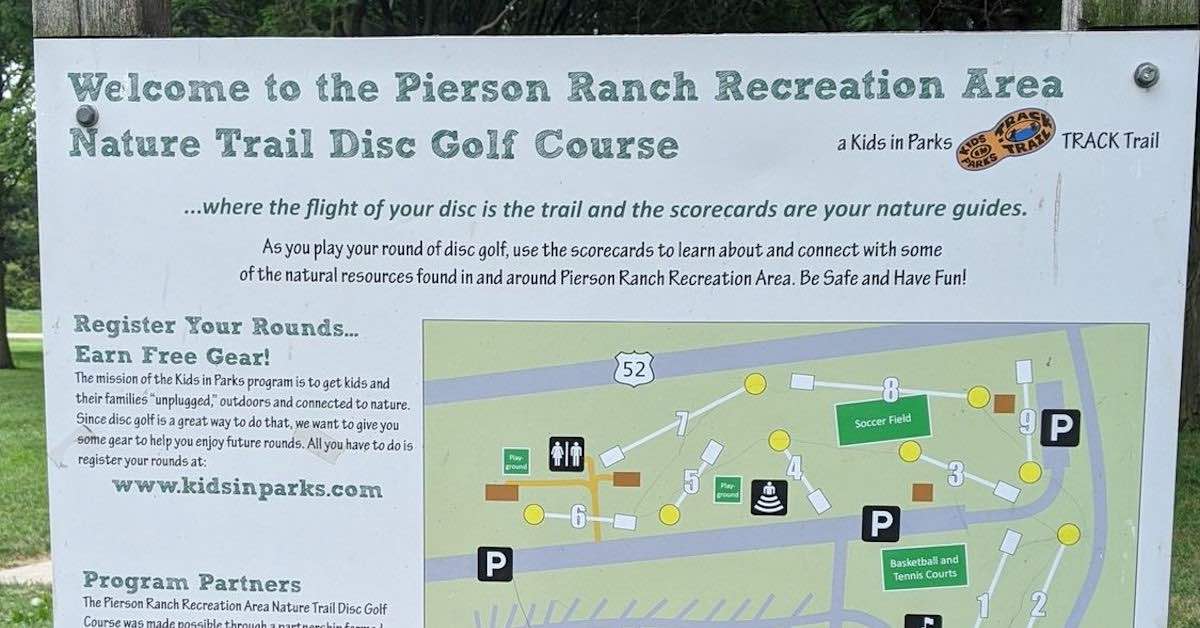
Studies have shown that not only does outdoor play have incredible benefits for children by increasing brain activity, lowering rates of ADHD, depression, and obesity, but it also improves communities by creating the next generation of nature and public land stewards. While most disc golfers are happy to provide anecdotal evidence of the physical and mental benefits of disc golf, Kids in Parks is one of few health-related nature programs in the United States that has data demonstrating the positive effects of spending time outdoors.
The Disc Golf Nature Trail
Kids in Parks likes to think about and explain disc golf to newcomers as "a hike with a Frisbee." But Kids in Parks courses also come with something else: interesting facts about local environments and ecosystems.
"I thought, 'Let's create nature trail disc golf courses,'" said Jason Urroz, Director of Kids in Parks. "The flight of the Frisbee is the trail, and the upside is the trail changes every time you play. A hiking trail is the exact same route other than seasonality changes, but with disc golf you get a different experience every time you play."
Urroz is an avid disc golfer himself who had played 700 courses in 49 states and seven countries when we spoke to him. He's excited to have found a way to integrate his personal passion into his work in a way that promotes better health for children and families.
There are now 25 nature trail disc golf courses in four states listed as available TRACK adventures on the Kids in Parks website. They contain educational elements related to environmental and ecological topics on their scorecards and/or tee pads. Tee signs can feature information about surrounding flora and fauna specific to the region, such as how to spot poison ivy, what type of tree is next to the tee pad, or animals commonly seen in the area.
Some signs also include disc golfing tips from professional disc golfer and former U.S. Disc Golf Champion Nate Sexton.
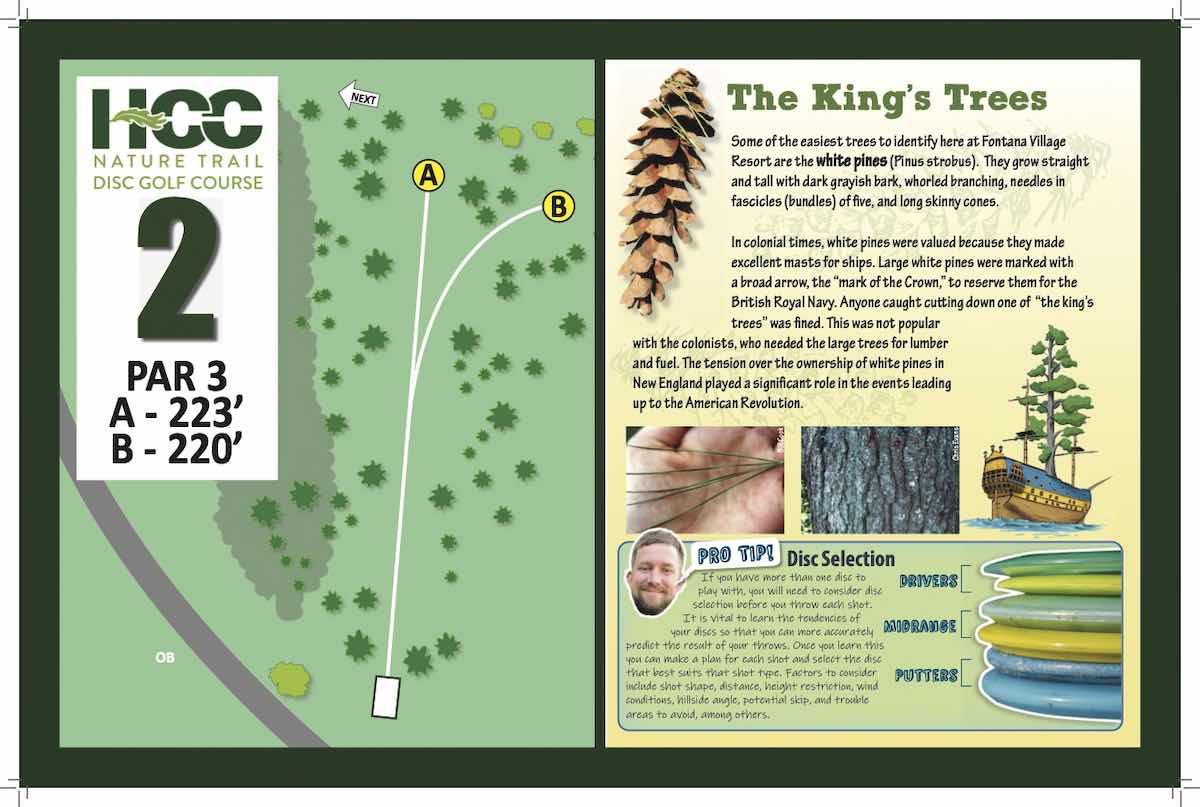
Along with fun, informational tee signs, Kids in Parks offers a couple of different scorecard designs to parks as well. Currently they have "birdies" and "tree love" scorecards, with traditional scorecard information on one side and a field guide to local species at the course on the other.
"The scorecards adapt to regional birds and trees," said Urroz. "We are very intentional about what pro tips and nature information is shared on a hole."
Education is a core component of many government parks and recreation organizations. By making education an essential part of their disc golf signage and programming, Kids in Parks can make it easier to get approval to use funding and resources to build and improve courses on state and federal land.
"The educational aspect is a great tool to convince supervisors who aren't familiar with the game to get behind investing in disc golf," says Scott Graham, Interpretive Park Ranger with the U.S. Army Corps of Engineers at Raystown Lake in Pennsylvania. "At State and Federal Parks it is always about getting the mission out there, and education is an essential part of that mission."
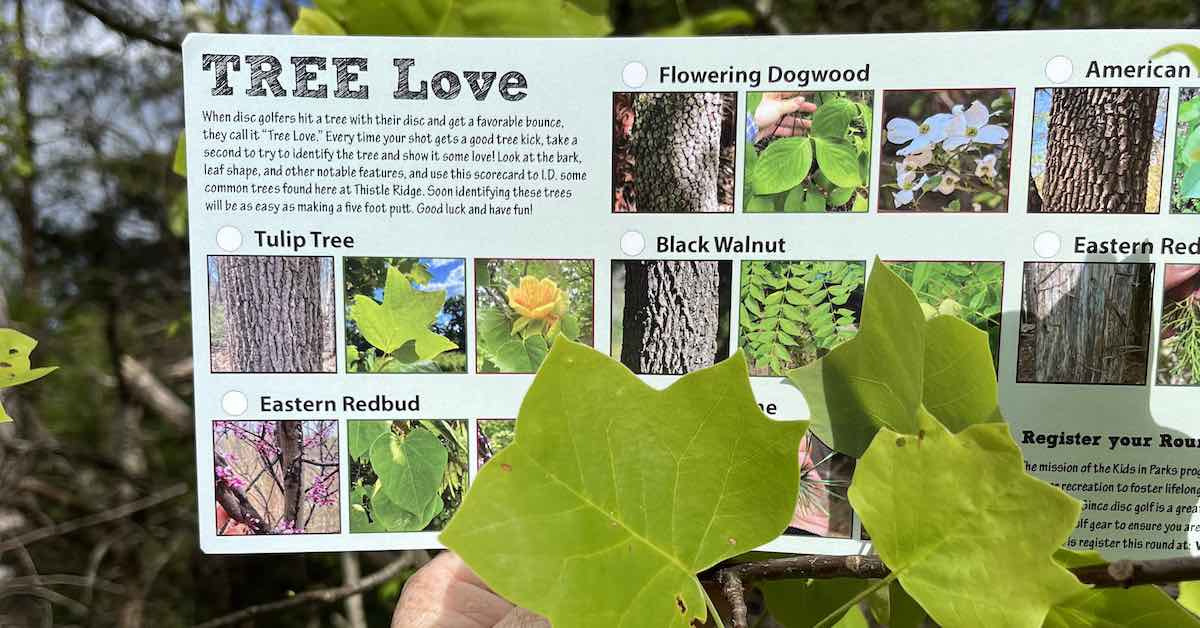
Not only can Kids in Parks help convince stakeholders that disc golf fits the mission of their parks, they can also help streamline course creation by providing their time and expertise.
"At the time of our partnership, we really didn't have anyone in charge of education at state parks," said Lynn Spomer, who worked for 20 years with South Dakota Game, Fish, and Parks. "Kids in Parks was easy to work with and got us that education element that we needed. We just provided the information, and they put it all together for us, so we did hiking and disc golf all across the state."
Disc Golf for Better Health
Spomer is a big reason that South Dakota has more nature trail disc golf courses from Kids in Parks than any other state – currently 13. Along with their excellent educational aspects, she saw them as a great way to connect the missions of parks and health departments.
"We were really active with the health department," said Spomer. "We got state parks written into the statewide health plan and were looking for creative ways to get families outdoors. It was a great partnership between ourselves, Kids in Parks, and the health department."
There are plenty of reasons health authorities should be interested in promoting disc golf and other low-impact, accessible outdoor activities. Urroz said that increasingly "sedentary lifestyles" are leading to a host of physical and mental health issues such as obesity and depression. By supporting efforts to make healthy outdoor exercise more attractive, health departments are providing a fun form of preventative care.
"Hiking and throwing discs helps you stay fit; breathing fresh air and soaking in sunshine improves your mood, mental health, and focus," said Urroz. "All of these things go together for improved overall wellbeing."
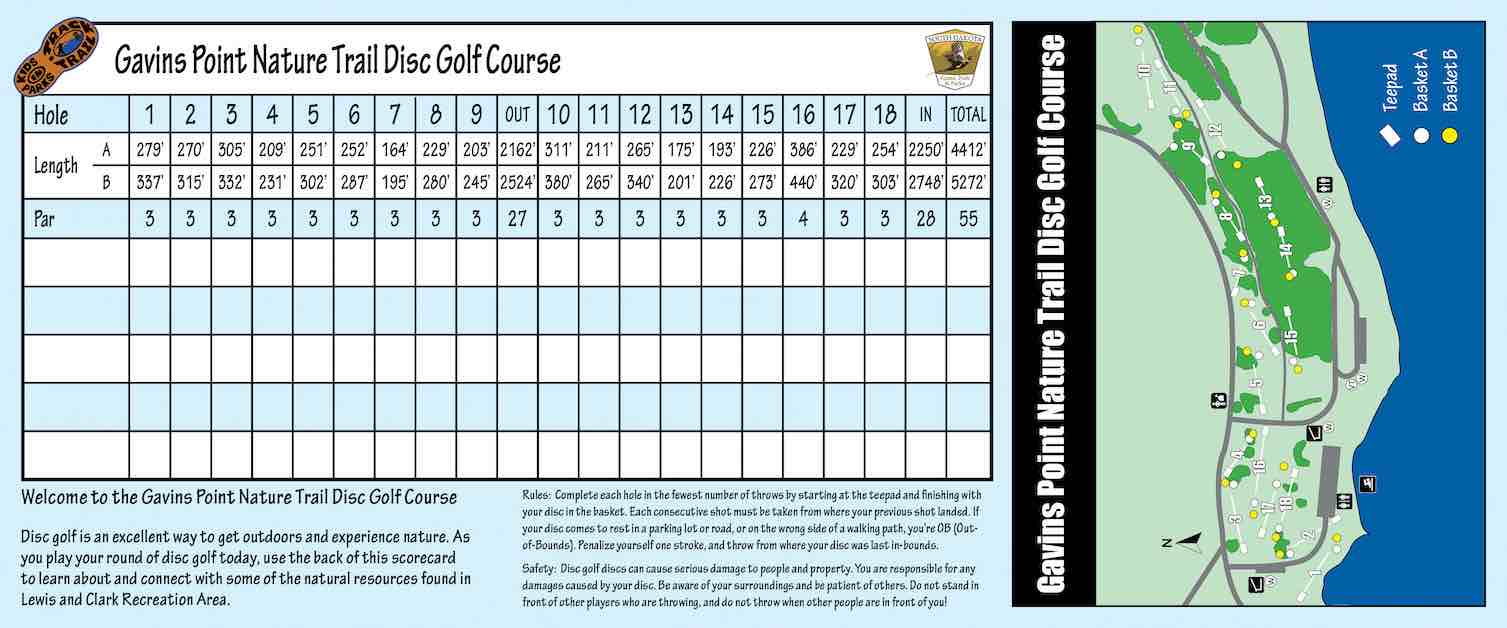
But it wasn't just any type of disc golf course that caught health officials' attention; it was ones made specifically to attract and feel achievable to kids.
"One of the stipulations of the health grant was that kids would be involved in the design of the disc golf courses," said Spomer. "We wanted to make the courses challenging but accessible for kids and to think of creative ways to get more kids involved."
Expanding Parks' User Base Through Disc Golf
Successfully combining numerous recreational activities to appeal to a wider demographic is frequently a goal at the types of parks where many nature trail disc golf courses are located, such as at Raystown Lake in Pennsylvania where the Seven Points Pine Nine course is located.
"We worked with Kids in Parks to help align with the Army Corps of Engineers mission and what they stand for," said Graham. "Our tee signs highlight local partnerships and other recreational opportunities. We want to connect disc golfers to other recreational opportunities in the area."
Davie Disc Golf Course, located in a 63 acre/25 hectare nature park in Mocksville, North Carolina, that offers fishing, hiking, and mountain biking is another great example of how disc golf can complement a variety of recreational activities.
"We thought disc golf would be a good fit because of how it is low impact on the land and is a passive sport by nature," said Allyson Sawtelle, Farmington Community Center Board Member. "It can be a challenge to merge disc golf with mountain biking and hiking – you need to be careful to make smart intersections – but they can live harmoniously and have been doing so here."
Sawtelle discovered Kids in Parks' work at Ashe County Park when she and her husband were touring disc golf courses throughout North Carolina in search of inspiration for Davie.
"They get kids unplugged and outside, and they can get free prizes when they visit a course," said Sawtelle. "This idea really resonated with me."
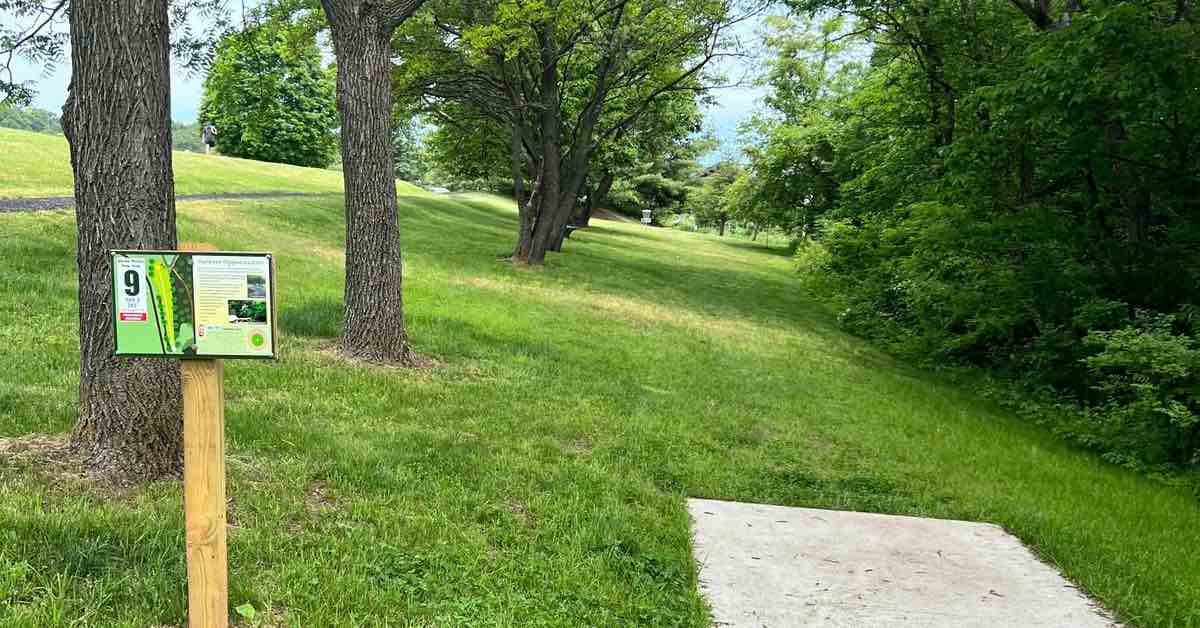
The State Parks System of South Dakota, home to nature trail courses such as Gavins Point and Pierson Ranch, found that working with Kids in Parks helped them expand their user base.
"Part of our mission or strategic plan is education," said Shane Bertch, District Park Supervisor for the State of South Dakota. "We're trying to get people to do other activities. I highly recommend partnering with Kids in Parks. The best thing is that it brings in a whole new demographic to the course."
Great Partnerships
Disc golf is a perfect fit for an organization like Kids in Parks because it is affordable and accessible to people of all backgrounds and most fitness levels while also having low impact on local ecosytems. In turn, organizations like Kids in Parks are terrific ambassadors for disc golf because they help introduce the sport to more people, expand what its facilities offer local communities, and educate players about how to respect the environments in which they play.
Best of all, such collaborations promote healthy lifestyles for kids and families while increasing the use and value of parks.
"It's fun to see families grow outside together," said Spomer. "That's what parks are all about: new opportunities for people to get out and enjoy the outdoors."
